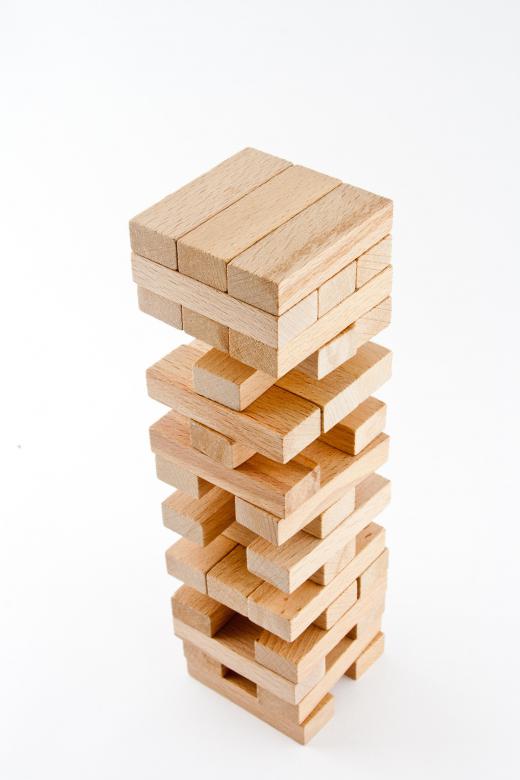What is Equilibrium?
 Mary McMahon
Mary McMahon
Equilibrium is a state in which no net change is occurring. Something in this state could be considered to be stable, balanced, or unchanging, and this is extremely rare, usually only existing for brief periods of time before something disturbs the balance. This concept is very important in the sciences, influencing everything from mathematics to the study of the universe, and there are a number of different types of equilibrium. In all cases, the term describes a stable state.
Most things tend to change over time, sometimes slowly and sometimes rapidly. The constant tendency to change makes it difficult to establish a state of stability, even when such a state is critically important. In the human body, for example, this is known as homeostasis, and it is very desirable — the body is constantly working to achieve it. In a simple example of how homeostasis works, cells and their surrounding fluid strive to maintain an isotonic environment, which allows waste material to flow out of a cell while new material flows in, resulting in no net change inside the cell.

In chemistry, the term “dynamic equilibrium” is sometimes used to describe a situation in which reactions and activity in a solution are balanced by opposing reactions, keeping the solution stable. In a simple example, a person can imagine placing two people on either end of a pole. If each person pushes with equal force against their end of the pole, the pole will not move, because the two opposing forces balance each other out.
It also plays a role in game theory, in the form of the symmetric equilibrium, in which all of the players in a game use an identical strategy. The field of mathematics is often very interested in the applications of this concept for everything from explaining how economic systems work to exploring complex problems and issues in physics.
Biological equilibrium is also important. Beyond the state of balance achieved in homeostasis, the body also uses the principles to maintain physical balance. The natural environment also tries to maintain a state of balance so that it can support living organisms. Biological researchers are interested in theoretical scenarios, such as what might happen if evolution reached a point of no net change, and living organisms stopped evolving. This situation is highly theoretical, because it would involve removal or counterbalancing of the numerous complex pressures that cause living organisms to evolve over time.
AS FEATURED ON:
AS FEATURED ON:











Discussion Comments
@NathanG - I would have to say that equilibrium, as applied to human existence, is probably not a good thing. That is to stay, we must always be changing, always transitioning—even “evolving” if you want to use that term—from one level to the next.
I can’t think of many examples where having no change would be good, except if everything in your life is just going swimmingly and you want to the good times to keep rolling along. But how often does that happen? Remember, “the only constant is change.”
@hamje32 - We must ask ourselves if equilibrium is a good thing or a bad thing as people generally understand the term and apply it to their lives. For example, sometimes people talk about the peaks and valleys of day to day living and use the term “equilibrium.” Is it good or bad when used in this sense?
Equilibrium physics examples in textbooks use everyday situations to illustrate the concept of opposing forces that balance each other out. One of the most common examples that you’ll see is two teams in a tug-of-war. As long as both teams exert equal and opposite forces, then there is no movement, and hence they are in a state of equilibrium.
Sometimes it’s hard to wrap your head around the concept at first because you think equilibrium means no other forces are involved. However, equilibrium does not mean no forces are in the picture, just that the forces cancel each other out and so there is no change.
Ask me how did I become such a physics expert? I spent the past year helping my daughter in her 12th grade physics.
Homeostasis is extremely important. If our body systems didn't readjust themselves when the outside conditions changed, we wouldn't be able to survive. Thankfully we have something called negative feedback that brings everything back to equilibrium for us.
If its hot out, it reverses that and cools us down and vice versa because we need to maintain a stable body temperature. Our hypothalamus does this for us. It monitors our temperature all the time to make sure we are at equilibrium.
Another kind of equilibrium that we learned in chemistry is thermal equilibrium. This is what happens when we hold a piece of metal in our hand for some time, for example. The heat from hand will transfer to the metal and will change its temperature. The metal will become warmer and warmer until it is the same temperature as our hand and will stop there. I has thermal equilibrium then.
The interesting part about thermal equilibrium is that we want to avoid it when it comes to insulating buildings. That's why we install insulation materials, so that our house doesn't become hot in the summer and cold in the winter. This is probably one of the few equilibrium that we don't want.
Post your comments